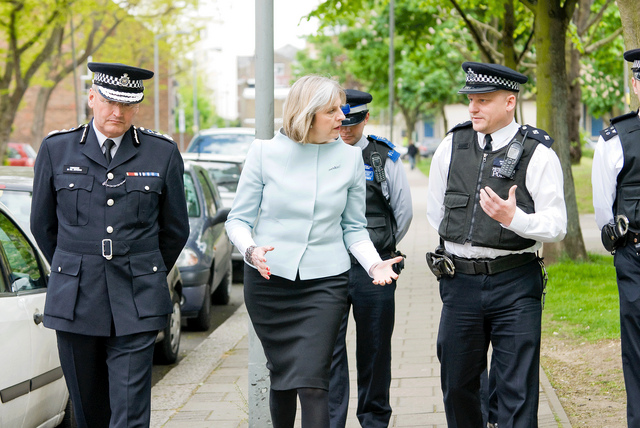The UK’s political parties do matter when it comes to determining immigration policy
Research on the impact of parties on public policy, and on immigration policy in particular, often finds limited evidence of partisan influence. Tim Bale and James Hampshire show that partisan influence depends not only on coalition dynamics, but how these dynamics interact with interdepartmental conflicts and lobbying by organised interests influence.

Credit: ukhomeoffice, CC BY 2.0
The fact that the Conservative-Lib Dem coalition has clearly been unable to meet its target of reducing net migration from the hundreds to the tens of thousands – a promise that could almost certainly never have been met and therefore should probably never have been made – must not be allowed to obscure the fact that UK migration policy has tightened measurably since May 2010 and that this has even had an appreciable impact on inflows. Inasmuch as the policy is a failure, then, it can at least be counted a heroic one.
That it cannot be counted as a success – that, put another way, the coalition managed to turn inputs into outputs but that this hasn’t been fully translated into outcomes – is hardly surprising. After all, even in the best of times, the ability to turn political dreams into policy realities comes perilously close to alchemy. Indeed, politicians can be said to be doing pretty well if they manage to turn gold into base metal let alone base metal into gold.
The ‘black box’ between election results and policy outcomes consists of a complex interplay between politicians, civil servants, and pressure groups. What matters is not simply a change of administration, although that is important, but also the relative strength and influence of various interest groups and government departments, all of which determines whether the impact of party will be concentrated or diluted. Coalition government adds a party political twist to all this since partisan differences often become intertwined with the functional division of labour and interests between different ministries, each with institutional memories and agendas of their own.
Opening the ‘black box’ that is Coalition migration policy since 2010 – an exercise involving interviews and documentary analysis that we report on in more detail elsewhere – reveals that, despite the formation of a coalition between two parties with apparently opposed policy positions, as well as interest group lobbying and intra-coalition conflicts in government, partisan influence on immigration policy is nonetheless clearly evident. In marked contrast to a Labour administration that liberalised immigration policy, the coalition has clearly introduced a more restrictive agenda. Despite its reliance on coalition partners with a more liberal policy, and despite significant opposition from pro-immigration interest groups, the Conservatives have been able to transpose their core election pledges into policy outputs and impact (even if more marginally than they hope) on outcomes.
Our study therefore throws doubt on the migration literature that downplays the significance of political parties for immigration policy outputs as well as outcomes, whether due to the ‘lock-in’ effects of previous policy decisions, or the influence of pro-immigration ‘clients’, or the inherent inability of EU member states to influence migration flows in a free market for labour with porous borders to a globalising world. The fact that UK immigration policy has gone from being one of the most restrictive anywhere in Europe during the Conservative dominated 1980s, to one of the most liberal under Labour in the early 2000s, and has now moved back in a more restrictive direction under a Conservative-led coalition since 2010 undermines the idea that there is a structural ‘expansionary bias’ in immigration policymaking.
In the UK’s ‘majoritarian’ (as opposed to ‘consensus’) democracy, immigration policies move sometimes in an expansionary direction, sometimes in a restrictive direction; and which party or parties are in government matters for explaining this. Further, although other non-policy factors no doubt play a role, the fact that numbers have come down in those areas where policy has been most significantly tightened, namely family and non-tertiary student migration, shows that governments and therefore parties are far from powerless in influencing migration outcomes. There might, of course, been a slightly different story to tell had one party, the Conservatives, not been able, from the negotiation of the coalition agreement onwards, to establish almost complete mastery of migration policy. But it did and therefore the song, as they say, remains the same.
However, what has gone on since 2010 also illustrates how partisan influence on immigration policy outputs is heavily mediated and constrained. Partisan influence has been mediated as much by functional dilemmas manifested through inter-departmental disagreements as by political differences between the coalition partners, though the former are sometimes reinforced or presented as partisan conflicts depending on ministerial portfolios.
Disagreements between the Home Office and the Department of Business, Innovation and Skills, have constituted a significant faultline in coalition debates over immigration. These are easily dramatized as ‘Theresa (May) vs Vince (Cable)’ but rather more important is the fact that they have pitted a control-oriented behemoth against a liberally-oriented minnow – a fight in which there was only ever going to be one overall winner.
The qualifier ‘overall’, however, is important. The variation between policy subfields (e.g. work, student, and family migration) shows that the impact of party has also been heavily mediated by both intra- (rather than inter-) party arguments and organized interests. BIS has, on occasions, been able to call on the assistance of an economically liberal Chancellor who, for various reasons, is disinclined to give the Home Secretary everything she wants, and whose Department is a match (indeed probably more than a match) for hers.
Mrs May’s increasingly (some would say painfully) obvious leadership ambitions have almost certainly reduced the backing she has received recently from the Prime Minister – something our study revealed was previously vital in settling arguments in her favour. BIS also has some powerful allies in the business world, whose success in getting changes made to the rules on highly skilled (and highly paid) labour migration stands in marked contrast to the mixed record of the education sector and the near-complete failure of migrant-rights organisations in achieving their goals.
To understand the degree to which electoral pledges influence policy outputs, and ultimately perhaps outcomes, then, requires painstaking examination of the interplay between partisan change, interest groups, and interdepartmental conflict. Our case suggests that while it is sometimes possible to parse these different elements, often it is not. This means there are limitations to scholarly approaches to immigration that focus on one or the other of the factors outlined above: political economists on employers and other lobby groups; party scholars on political parties; and institutionalists on functional and bureaucratic conflict.
In the search for impressively parsimonious explanations a lot of (how shall we put it?) ‘non-trivial complexity’ gets lost. Each of the above approaches has considerable merits, but can provide at best a partial picture of how politics shapes immigration policy outputs. Our aim should be to combine them, without losing sight of the wood for the trees.
—
Note: this post represents the views of the author, and not those of Democratic Audit or the LSE. Please read our comments policy before posting.
—
 Tim Bale is Professor of Politics at Queen Mary’s University and a Trustee of Democratic Audit UK.
Tim Bale is Professor of Politics at Queen Mary’s University and a Trustee of Democratic Audit UK.
Dr J ames Hampshire is Senior Lecturer in Politics at the University of Sussex
ames Hampshire is Senior Lecturer in Politics at the University of Sussex





 Democratic Audit's core funding is provided by the Joseph Rowntree Charitable Trust. Additional funding is provided by the London School of Economics.
Democratic Audit's core funding is provided by the Joseph Rowntree Charitable Trust. Additional funding is provided by the London School of Economics.
James Hampshire & @ProfTimBale: Tories HAVE reduced immigration:
https://t.co/8TERCgeSnP
Shows parties matter for immigration levels
Thank the Lib Dems that Coalition immigration policy hasn’t been even harsher https://t.co/b1gkUxhUsr via @jdportes https://t.co/oodA2BqQoA
How immigration policy gets made. @ProfTimBale & James Hampshire: https://t.co/HYPssAliXk Politics matters..
May vs. Cable or ‘a control-oriented behemoth v. liberally-oriented minnow’. How immigration policy gets made https://t.co/iw65BeT7jW
‘It’s complicated!’ How parties, ministries, & pressure groups impact immigration policy: https://t.co/UZMSZC5eEU https://t.co/CskGYkIwua
Politicians “doing pretty well if they manage to turn gold into base metal let alone base metal into gold.” Alchemy: https://t.co/UZMSZC5eEU
Political parties do impact immigration policy | @ProfTimBale & James Hampshire
https://t.co/sna99MgLCn
Parties matter when it comes to determining UK #immigration policy but so does ministerial & pressure group clout https://t.co/UZMSZC5eEU
[…] Political parties can and do have an influence on immigration policy, despite a widespread scepticism about their ability to influence who does and doesn’t enter the UK, according to research by Tim Bale and James Hampshire. Find out more here. […]
The UK’s political parties do matter when it comes to determining immigration policy https://t.co/gymGpFmkKx
The UK’s political parties do matter when it comes to determining immigration … – Democratic Audit UK https://t.co/109x8O83Pn
The UK’s political parties do matter when it comes to determining immigration policy https://t.co/1nw5xaj1he